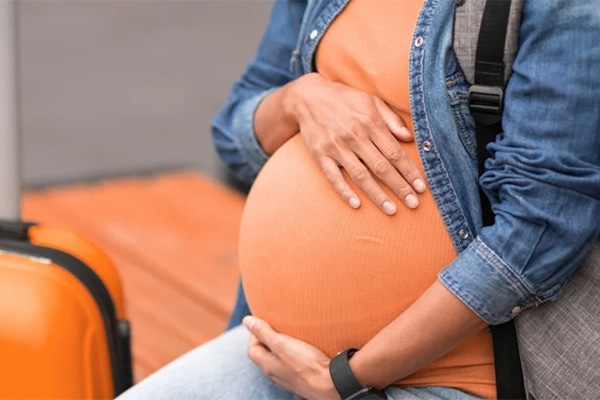Are you pregnant and thinking about traveling? It is better to get some facts right before you book your tickets. Normally it is safe to travel during the second trimester, as long as you do not have any complications with your pregnancy.
When planning a trip it is better to avoid traveling to developing nations while pregnant due to the risk of diseases and lower-quality medical facilities. However, with the right precautions, like travel insurance, you can travel safely even into the later stages of pregnancy.
Wherever you go, make sure to find out what healthcare options are available nearby in case you need urgent medical help. It is always a good idea to carry your maternity medical records with you so you can share important information with professionals if needed.
Remember to share your plans with your doctor to get his/her approval before booking your tickets for a safe and sound trip.
When Can I Travel in Pregnancy?
A few expecting mothers don't like to travel in the first 12 weeks of their pregnancy due to symptoms like morning sickness, nausea, or vomiting. Some even feel extremely tired during these days. Not only that, the chance of a miscarriage is higher in the first 3 months, whether you're traveling or not. Therefore, it is always recommended to take good care of yourself during these first few weeks of pregnancy.
Also, traveling in the last months of pregnancy can be tiring and uncomfortable too. That is why most pregnant women think the best time to travel is in the middle of their pregnancy period, ie., between the 4th and 6th months.
Flying While Pregnant
Flying isn't harmful to you or your baby, but talking to your midwife or doctor before you fly is important, especially if you have any health issues or complications during your pregnancy.
Normally, the chance of going into labor increases after 37 weeks (around 32 weeks if you have twins). Therefore some airlines may not allow you to fly towards the end of your pregnancy period, so it is always a good idea to check the airline policies before you book your tickets.
Once you reach week 28 of your pregnancy, the airline might ask for a letter from your doctor or midwife to confirm your due date and make sure you are not facing any kind of risk or complications. Remember, you might have to pay for this letter and wait a few weeks to receive it.
Another major thing to consider when traveling via flights is those that take more than 4 hours to reach the destination. Taking long flights seems to have a small risk of blood clots. To reduce this risk, try to drink plenty of water and move around in intervals, like every 30 minutes. You can also buy compression or support stockings from the pharmacy and carry your pregnancy body pillow to help prevent leg swelling and discomfort.
ELI&ELM SPECIAL OFFER!
Things to Consider Before and During Your Flight
- Skip foods forming gastric issues and fizzy drinks before taking off to avoid discomfort.
- Keep your seatbelt fastened under your belly, i.e., low on the hipbones.
- Drink plenty of fluids/water to prevent dehydration, which can affect blood flow to the uterus.
- Walk every half hour if possible. If not, flex and extend your ankles while seated to boost circulation.
- An aisle seat makes it easier to move around. Bulkhead seats offer more space, while seats over the wing provide a smoother ride.
Road Travel While Pregnant

It is better to avoid long car/train trips when you're pregnant, but if you have to, make sure to take breaks every hour. Sitting for a long time might put you in pain and discomfort and also increase the chance of a blood clot in your legs. Therefore to feel better and lower the risk of a blood clot, try moving around and stretching your knees and ankles often during the journey. If you're in a car, take a break at least every 2 hours, and if you're on a train, walk through the carriage to boost circulation.
Sometimes, traveling can create motion sickness. It might be better to plan trips during your mid-pregnancy period when nausea and vomiting are a little less common. If you need medicine for motion sickness, ask your doctor because not all options are safe when you are pregnant.
Pregnancy can make you feel tired and dizzy, so stay hydrated and eat healthy snacks like fruits and nuts during your road journeys. Remember, when traveling via car, make sure the air is circulating well, and wear your seatbelt properly. Put the cross strap between your breasts and the lap strap across your pelvis under your bump, not over it.
Is Sailing Pregnant Safe?
When planning to sail during pregnancy remember that there are certain rules followed by Ferry companies about carrying pregnant women, and they might say no if you're almost towards your last trimesters (usually after 32 weeks on regular ferries and 28 weeks on faster ones). Make sure to check their policies before you make a booking.
If you're planning a longer boat trip, like a cruise, see if there are medical services and things on the boat to help you if required.
High-Risk Pregnancy Symptoms to Look For Before Travelling
If you're 35 years or older and this is your first pregnancy, it's recommended not to travel. Also, avoid traveling if you are dealing with the following issues—
- Vaginal bleeding
- Having twins
- Gestational diabetes
- Problems with the cervix, like an 'incompetent cervix'
- High blood pressure
- Abnormalities with the placenta
- Medical history of miscarriage
- Past ectopic pregnancy
- Previous premature labor
What Vaccination Should I Take When Travelling Pregnant?
Most vaccines that use live bacteria or viruses are not suggested during pregnancy because they might harm the baby growing inside you. However, in some cases, if the risk of getting sick is higher than the risk from the vaccine, your doctor or midwife might consider live travel vaccines during pregnancy. Always ask them for advice about specific travel vaccinations. Vaccines that are not live (inactivated) are safe to use during pregnancy.
For instance, malaria tablets might not be safe for pregnant women, so talk to your doctor about the right options. On the other hand, The Zika virus is mainly spread by mosquitoes in certain parts of the world. While it's usually mild for most people, it can be a problem if you're pregnant.
During pregnancy, it is highly recommended not to travel to places where the Zika virus is present. These include parts of South and Central America, Africa, the Pacific islands, the Caribbean, and Asia. Always check the current disease rate of the country you're planning to travel especially when pregnant.
Keep an Eye on What You Eat and Drink

Be careful about what you eat and drink while traveling to avoid getting sick from food and water like an upset stomach and travelers' diarrhea as medication for these issues may not be safe during pregnancy.
Always make sure the tap water is safe before drinking it. If you're not sure, it's better to drink sealed bottled water. If you get sick, make sure to stay hydrated and keep eating, even if you don't feel hungry. This is important for your baby.
Plan Your Pregnancy Travel With Eli & Elm
You can easily plan a safe trip if you want to. The only thing you have to do is listen to your healthcare advisor and plan accordingly. Take your time when planning to travel. Also, stay hydrated, and move around when you can, whether you're on a plane, in a car, or on a boat.
Being comfortable can make a big difference during the journey therefore do not forget to pack your favorite snacks, drinks, and most importantly your go-to pregnancy pillow by Eli & Elm. Most importantly just relax and take it easy, enjoy the trip, but do not forget to take the required precautions for yourself and your little one on board!












